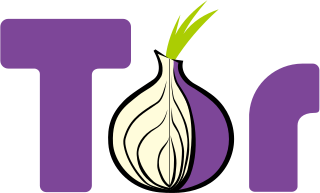
In computer networking, a proxy server is a server application that acts as an intermediary between a client requesting a resource and the server providing that resource. It improves privacy, security, and possibly performance in the process.
BitTorrent, also referred to simply as torrent, is a communication protocol for peer-to-peer file sharing (P2P), which enables users to distribute data and electronic files over the Internet in a decentralized manner. The protocol is developed and maintained by Rainberry, Inc., and was first released in 2001.
An anonymous P2P communication system is a peer-to-peer distributed application in which the nodes, which are used to share resources, or participants are anonymous or pseudonymous. Anonymity of participants is usually achieved by special routing overlay networks that hide the physical location of each node from other participants.
The Invisible Internet Project (I2P) is an anonymous network layer that allows for censorship-resistant, peer-to-peer communication. Anonymous connections are achieved by encrypting the user's traffic, and sending it through a volunteer-run network of roughly 55,000 computers distributed around the world. Given the high number of possible paths the traffic can transit, a third party watching a full connection is unlikely. The software that implements this layer is called an "I2P router", and a computer running I2P is called an "I2P node". I2P is free and open sourced, and is published under multiple licenses.

A darknet or dark net is an overlay network within the Internet that can only be accessed with specific software, configurations, or authorization, and often uses a unique customized communication protocol. Two typical darknet types are social networks, and anonymity proxy networks such as Tor via an anonymized series of connections.
BitTorrent is a proprietary adware BitTorrent client developed by Bram Cohen and Rainberry, Inc. used for uploading and downloading files via the BitTorrent protocol. BitTorrent was the first client written for the protocol. It is often nicknamed Mainline by developers denoting its official origins. Since version 6.0 the BitTorrent client has been a rebranded version of μTorrent. As a result, it is no longer open source. It is currently available for Microsoft Windows, Mac, Linux, iOS and Android. There are currently two versions of the software, "BitTorrent Classic" which inherits the historical version numbering, and "BitTorrent Web", which uses its own version numbering.

Java Anon Proxy (JAP) also known as JonDonym, was a proxy system designed to allow browsing the Web with revocable pseudonymity. It was originally developed as part of a project of the Technische Universität Dresden, the Universität Regensburg and Privacy Commissioner of the state of Schleswig-Holstein. The client-software is written in the Java programming language. The service has been closed since August 2021.

Pando was an application which was mainly aimed at sending files which would normally be too large to send via more "conventional" means. It used both peer-to-peer and client-server architectures and was released for Windows and Mac OS X operating systems.

xB Browser was a web browser designed to run on both the Tor and XeroBank anonymity networks, and is available as component of the xB Machine and the xB Installer.

Tribler is an open source decentralized BitTorrent client which allows anonymous peer-to-peer by default. Tribler is based on the BitTorrent protocol and uses an overlay network for content searching. Due to this overlay network, Tribler does not require an external website or indexing service to discover content. The user interface of Tribler is very basic and focused on ease of use instead of diversity of features. Tribler is available for Linux, Windows, and OS X.

Vuze is a BitTorrent client used to transfer files via the BitTorrent protocol. Vuze is written in Java, and uses the Azureus Engine. In addition to downloading data linked to .torrent files, Azureus allows users to view, publish and share original DVD and HD quality video content. Content is presented through channels and categories containing TV shows, music videos, movies, video games, series and others.
The following is a general comparison of BitTorrent clients, which are computer programs designed for peer-to-peer file sharing using the BitTorrent protocol.
An anonymizer or an anonymous proxy is a tool that attempts to make activity on the Internet untraceable. It is a proxy server computer that acts as an intermediary and privacy shield between a client computer and the rest of the Internet. It accesses the Internet on the user's behalf, protecting personal information of the user by hiding the client computer's identifying information such as IP addresses. Anonymous proxy is the opposite of transparent proxy, which sends user information in the connection request header. Commercial anonymous proxies are usually sold as VPN services.

Phex is a peer-to-peer file sharing client for the gnutella network, released under the terms of the GNU General Public License, so Phex is free software. Phex is based on Java SE 5.0 or later.

Tor is a free overlay network for enabling anonymous communication. Built on free and open-source software and more than seven thousand volunteer-operated relays worldwide, users can have their Internet traffic routed via a random path through the network.

StealthNet is an anonymous P2P file sharing software based on the original RShare client, and has been enhanced. It was first named 'RShare CE'. It use the same network and protocols as RShare.
Internet censorship circumvention is the use of various methods and tools to bypass internet censorship.

PirateBrowser is an Internet browser by The Pirate Bay used to circumvent Internet censorship.

μTorrent, or uTorrent, is a proprietary adware BitTorrent client owned and developed by Rainberry, Inc. The "μ" in its name comes from the SI prefix "micro-", referring to the program's small memory footprint: the program was designed to use minimal computer resources while offering functionality comparable to larger BitTorrent clients such as Vuze or BitComet. μTorrent became controversial in 2015 when many users unknowingly accepted a default option during installation which also installed a cryptocurrency miner.
A wireless onion router is a router that uses Tor to connect securely to a network. The onion router allows the user to connect to the internet anonymously creating an anonymous connection. Tor works using an overlaid network which is free throughout the world, this overlay network is created by using numerous relay points created using volunteer which helps the user hide personal information behind layers of encrypted data like layers of an onion. Routers are being created using Raspberry Pi adding a wireless module or using its own inbuilt wireless module in the later versions.









